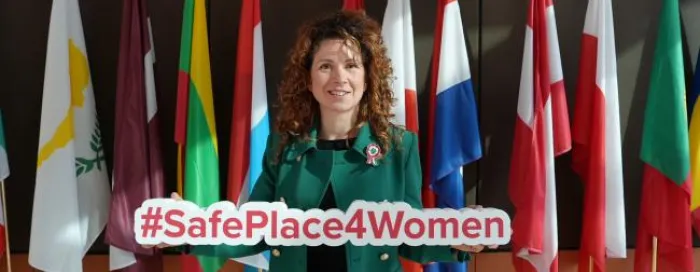This interview with PES Group member Kata Tüttő, Vice-mayor of Budapest, is part of our #SafePlace4Women campaign and of our series #ProgressiveLocalStories, aimed at raising awareness on the many positive initiatives implemented by progressive cities and regions in Europe when it comes to promoting a social, fair and sustainable Europe.
You have recently adopted a strategy in Budapest on preventing violence against women. What is the backbone of this strategy? What are the first concrete steps you plan to take?
In an ongoing effort to prevent and combat domestic violence while ensuring victims’ protection from all forms of violence, Budapest has recently adopted a comprehensive strategy. At its core, this strategy aims to align with the Budapest Local Equal Opportunities Programme, striving to eliminate all forms of discrimination against women, promote gender equality and strengthen women’s positions in society.
The backbone of this strategy lies in the formulation and implementation of specific municipal policies aimed at preventing domestic violence and providing assistance and protection to victims. Key components of this strategy include the following.
- Educational campaigns: Launching educational initiatives and awareness-raising campaigns aimed at the general population to educate them on the issues of domestic violence and child abuse. Using various communication channels, including public advertising spaces owned by the municipality, these campaigns will be designed in consultation with experts and civil society organisations to effectively address the issue.
- Promoting victim support services: Supporting events and forums that showcase the work and services provided by institutions and organisations that assist victims of domestic violence. This aims to raise awareness about available support networks and encourage victims to seek help.
- Preventive programmes and training: Creating opportunities to implement preventive programmes and training for professionals within municipal-owned companies and social institutions. This involves exploring the adaptation and wider implementation of existing programmes like the ‘conscious neighbour’ initiative in different districts of Budapest.
- Disseminating information: Facilitating the dissemination of informative materials such as posters, leaflets and publications related to domestic violence prevention and awareness in various municipal owned or operated facilities accessible to the public, such as libraries, event venues and customer service offices.
- Support for civil society organisations: Supporting existing prevention activities and professional training conducted by civil society organisations, ensuring their accessibility to a wider audience. Additionally, providing external venues for preventive activities targeting young people, thus responding to their needs and preventing their exclusion from schools.
These are concrete steps form the initial actions outlined in Budapest’s strategy to prevent violence against women. By focusing on education, support services, preventive measures and collaboration with civil society, Budapest aims to create a safer environment for women and combat gender-based violence effectively.
How can the European Union contribute to making Budapest a safer place for women?
To make Budapest a safer place for women, the European Union (EU) can play a crucial role by addressing various socio-economic factors that contribute to women’s vulnerability. Here is how the EU can contribute across key areas.
- Housing: The EU can support initiatives to ensure affordable and safe housing for women, especially those fleeing domestic violence situations. Funding programmes aimed at providing housing assistance and shelters for victims can significantly enhance their safety and well-being.
- Quality jobs: The EU can promote initiatives that enhance women’s access to quality employment opportunities through funding and policy support. This includes investing in skills training, entrepreneurship programmes and initiatives that combat workplace discrimination, thus empowering women economically and reducing their vulnerability to violence.
- Equal pay: The EU can enforce and strengthen legislation to ensure equal pay for equal work, closing the gender pay gap. By advocating for transparent pay practices and promoting gender equality in the labour market, the EU can contribute to women’s financial independence and reduce their dependence on abusive partners.
- Equal share of non-paid work: The EU can promote policies and campaigns that encourage the equal distribution of caregiving and household responsibilities between men and women. Supporting initiatives such as parental leave policies, affordable childcare and awareness-raising campaigns on gender stereotypes can help shift societal norms and reduce the burden of unpaid work on women.
- Women’s health: The EU can invest in healthcare infrastructure and services that specifically cater to women’s health needs. This includes funding for sexual and reproductive health services, mental health support, and programmes that address domestic-violence-related trauma. By prioritising women’s health, the EU can ensure that women have access to comprehensive care and support, thereby improving their overall well-being and safety.
By addressing these interconnected issues, the EU can contribute significantly to making Budapest a safer and more inclusive city for women, fostering environments where women can thrive, free from violence and discrimination.
In Lisbon with our members @IsildaCor & @KTutto together with @zgurmai_EN to call all cities and regions to be a #SafePlace4Women!
Let's create safer, more inclusive cities for women. No more excuses, join us in building a Europe where freedom, equality, and dignity prevail. pic.twitter.com/PmM8B1Hcs8— PES Group | European Committee of the Regions (@PES_CoR) June 9, 2023
